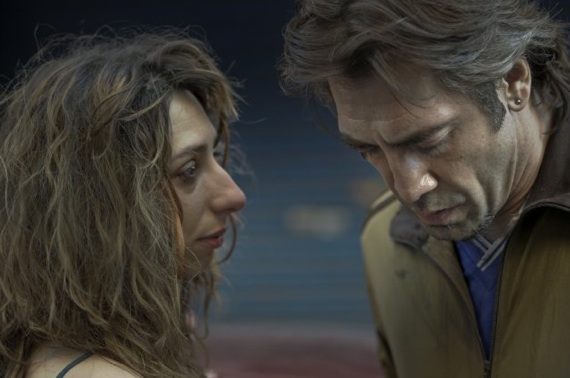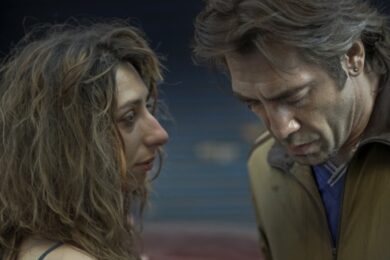Scan the highest-grossing films of 2010 and you’ll struggle to find anything approaching the real world. These alternative, computer-generated, realities of wizards, dragons, dream stealers and vampires are the result of the recession, people will tell you. In troubled times we want our escapism more escapist than usual: we need those talking animals, Iron Men and Titans to save us so we can dream another day.
What bravery then to go against this glossy grain – for mere mortal directors to shake their fists in the face of the facile fantasy-mongering of Hollywood’s dream factory: directors like Mexico’s Alejandro Gonzales Iñárritu and films like Biutiful, coming to an awards ceremony near you very soon.
The trouble with this theory is that the recession didn’t invent cinematic escapism: 2009’s top grossers looked much the same as 2010’s do. You’d have to go back to a pre 9/11 age to find a realist drama in that top 10 (2000’s The Ice Storm). And you’d have to uninvent cinema to escape escapism altogether. But the fact is, a film like Biutiful isn’t quite as unique as it likes to think it is. Because a rung or two beneath those glossy high grossers, there’s always plenty of realism about – well, cinema’s version of “realism” anyway. It might not make as much financial capital as wizards and vampires, but its cultural capital is, via critics, film buffs and Oscar panels, often greater. The Oscars this year will likely be rewarding The King’s Speech, Blue Valentine and The Kids Are All Right.
In fact it can sometimes feel like directors deem the grittier their realism, the greater their art. The last twelve months has seen the garlanding of John Hillcoat’s grimmer than grim The Road (kitchen sink sci fi) and the hailing of Michael Hanneke’s characteristically bleak The White Ribbon (mythic realism) while the only thing ecstatic about Jacques Audiard’s A Prophet was its critical reception. If anyone thought those films were depressing, Biutiful goes one louder: gloom turned up to 11. Although it flirts with realism of the “magic” kind, Biutiful is a grimly realistic account of a man’s descent into a depressingly prosaic hell.
Iñárritu has never exactly played his films for laughs. 2000’s debut Amores Perros was an often grisly glimpse into Mexico City’s underworld, but there was still light shining between the cracks (mainly via the relationship between Gael Garcia Bernal’s and Vanessa Bauche’s Octavio and Susana). The director’s American debut, 2003’s 21 Grams was an anguished depiction of loss, but the sexual chemistry of Naomi Watts and Sean Penn took it somewhere else. 2006’s Babel was rather a misfire, managing to be both grim and glossy, with its distracting stars and multiple, “take a look at this budget” locations.
So it’s initially a relief to see Inarritu keeping it tight this time. A return to his first language, Spanish after two largely English films: a close focus on a single location, Barcelona; one main character, Uxbar (Bardem), and a reasonably taut and – unusual for Inarritu – linear plot line.
So: single dad Uxbal scratches a living from communicating with the recently deceased to comfort the grieving alongside some dodgy dealing in drugs and construction, employing illegal Chinese immigrants in partnership with disloyal brother (Eduard Fernandez). Enmeshed in this brutal world Uxbal tries to still be as good a person as he can manage: to be a decent dad, to treat the immigrants with consideration (while still making money) and to manage the unpredictable behaviour of his on again / off again bipolar ex (Argentinian Maricel Alvarez). Then he discovers he’s got limited time to live. OK, let’s stop there: less to avoid spoiling the plot than to not bring you down any further. And yes, it really does get more depressing than that.
You’ll have gathered by now that Biutiful is an ironic title (the misspelling Uxbal’s: he’s poor, he’s foreign, got it?). Because there’s no beauty here. We’re definitely not in Oz anymore. We’re barely even in Barcelona, certainly not tourist, stag party Barcelona. Forget the film’s flirtation with magic realism, Biutiful is realism of the ‘grittiest’ kind. Grind the audience’s face in the dirt realism. “Life’s a bowl of shit” realism. A film shot in glorious 1D. Watching this will put, upon exiting the cinema, the most dedicated January detoxer’s determination to the test. Go on, make it a double: you’ll need it.
There’s no doubt that, as Uxbal, Bardem is excellent. His battered handsomeness attains a dogged stoicism that’s a long way from his early career roles in queasily frothy Spanish comedy like 1992’s Jamon Jamon, and possessed of far greater depth than his previous Oscar win (for No Country For Old Men.) Maricel Alvarez as his wife also does a nice job: and is a fine bit of totally un-Hollywood casting, her quirkily, life-knocked, un-plasticized looks here projecting an off-kilter, slightly hysterical sensuality.
These actors do a lot with what they’ve got. Why wouldn’t they? There’s relatively little action or dialogue to get in their way (it’s perhaps worth noting here that Inarritu fell out with regular screenwriter Guillermo Arriaga during Babel, banning his longtime collaborator from its Cannes screening). So what the actors have got is acres of space to stare into, miles of emptiness in which to emote. It’s hard to resist the feeling that darkness is here being substituted for depth. If it hurts, it’s art. But surely, depressing your audience is just as banal as offering them a glossy, computer-generated escape? It’s Oscar-baiting, auteur self-proclaiming and can feel just as cynical or contrived as any film franchise you care to mention. Middle paths and compromises are rather discredited thanks to the Coalition, but if it’s a devil/deep blue sea choice between, say, Harry Potter and Biutiful at least that dratted wizard won’t put you off your popcorn.



